Rebecca Blu-ray Movie
HomeRebecca Blu-ray Movie 
Criterion | 1940 | 131 min | Not rated | Sep 05, 2017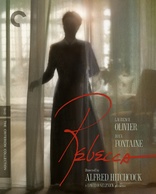
Movie rating
8.3 | / 10 |
Blu-ray rating
| Users | 5.0 | |
| Reviewer | 5.0 | |
| Overall | 5.0 |
Overview
Rebecca (1940)
A young bride is terrorized by the memories of her husband's glamorous first wife.
Starring: Laurence Olivier, Joan Fontaine, George Sanders (I), Judith Anderson, Nigel BruceDirector: Alfred Hitchcock
| Drama | Uncertain |
| Romance | Uncertain |
| Psychological thriller | Uncertain |
| Mystery | Uncertain |
| Thriller | Uncertain |
Specifications
Video
Video codec: MPEG-4 AVC
Video resolution: 1080p
Aspect ratio: 1.33:1
Original aspect ratio: 1.37:1
Audio
English: LPCM Mono (48kHz, 24-bit)
Music: Dolby Digital Mono
Subtitles
English SDH
Discs
Blu-ray Disc
Two-disc set (2 BDs)
Playback
Region A (locked)
Review
Rating summary
| Movie | 4.0 | |
| Video | 5.0 | |
| Audio | 5.0 | |
| Extras | 5.0 | |
| Overall | 5.0 |
Rebecca Blu-ray Movie Review
Reviewed by Dr. Svet Atanasov September 6, 2017Winner of Oscar Awards for Best Picture and Best Cinematography, Alfred Hitchcock's "Rebecca" (1940) arrives on Blu-ray courtesy of Criterion. The supplemental features on the disc include an original rerelease trailer; new video program featuring visual effects specialist and film historian Craig Barron; archival audio commentary with film scholar Leonard J. Leff; archival interview with Alfred Hitchcock; three archival radio adaptations of the film; screen tests; and a lot more. The release also arrives with a 38-pagge illustrated booklet featuring critic and David O. Selznick biographer David Thomson's essay "Welcome to the Haunted House", reprinted production correspondence from the producer's archives, and technical credits. In English, with optional English SDH subtitles for the main feature. Region-A "locked".
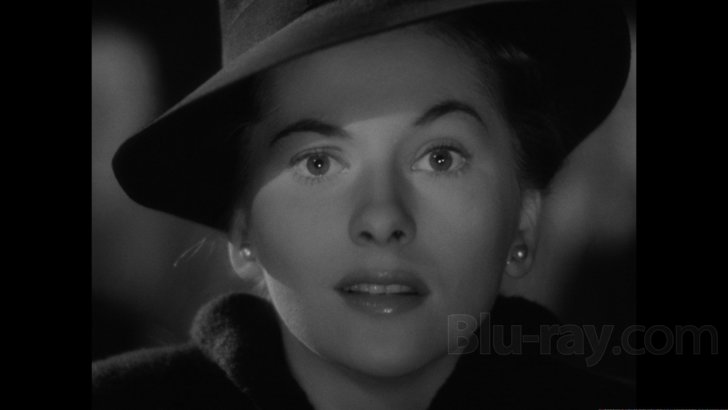
The new Mrs. de Winter
Rebecca is based on Daphne Du Maurier’s famous novel, but three-quarters of it actually feel like an ambitious and quite loose take on the classic Cinderella story designed to convince skeptics that Alfred Hitchcock can freely navigate through more than a few contrasting genres and remain equally successful. Considering the fact that it was the iconic director’s first Hollywood film, it is hardly surprising that it is essentially a carefully crafted statement.
While tending to the caprices of an elderly American dame (Florence Bates) in Monte Carlo, a modest young girl (Joan Fontaine) -- whose real name deliberately isn’t revealed, just like in the novel -- is accidentally ‘discovered’ by the wealthy aristocrat Maxim de Winter (Laurence Olivier) who has been unsuccessfully trying to clear his mind after the tragic death of his beloved wife, Rebecca. Initially it is the dame that seeks Maxim’s company, but he politely rejects her and after a short rendezvous with the girl officially becomes the new Mrs. de Winter. The newlyweds then head back to Manderley, the lavish estate which until recently Maxim has been sharing with Rebecca. It is here that the film quickly switches gears and heads into that classic Hitchcockian territory where anything can happen -- and a lot does. While Mrs. de Winter struggles to get used to her new home and the ‘proper’ ways in which she ought to do a whole range of things, it becomes quite clear that the head housekeeper, Mrs. Danvers (Judith Anderson), isn’t willing to let go of the past. Naturally, the relationship between Mrs. de Winter and Mrs. Danvers quickly deteriorates, and as time passes by also threatens to collapse the relationship between the newlyweds. In a truly desperate attempt to reestablish herself in Manderley and strengthen Maxim’s confidence in their marriage, Mrs. de Winter then requests the resurrection of a once popular dressed ball, but when she appears wearing a stunning white dress that once belonged to Rebecca her plan backfires. Shortly after, an unexpected discovery forces the police to reexamine some of the crucial evidence that was gathered after Rebecca’s tragic death.
The film’s biggest flaw is its very obvious awareness that it cannot become too dark or too mean, which is something that has an instant negative effect on its Hitchcockian identity. However, it has to be made perfectly clear that this is a valid criticism only because now it can be compared to the latter films that do a lot of different things with greater flexibility to deliver precisely that unique ambience that Hitchcock’s best work is known for.
The crucial segment that gives the film its structure is very short and introduces a quick character transformation that brings conventional logic to a wide range of exchanges and actions that have been pushing it in different directions at the same time; after that there are only a few small details left to properly arrange before the big picture begins to make perfect sense. It is the same character transformation that also determines the credibility of the entire film. So if you conclude that it is not authentic enough, then you will probably walk away from the film thinking that it is simply an elaborate exercise in style -- which in a way it actually was.
Oddly, the least Hitchcockian part of the film is arguably the most genuinely entertaining one. After Maxim meets the future Mrs. de Winter in Monte Carlo there are some absolutely delightful sequences where the obnoxious dame is repeatedly snubbed by the young man with brilliant style and precision.
Rebecca Blu-ray Movie, Video Quality 
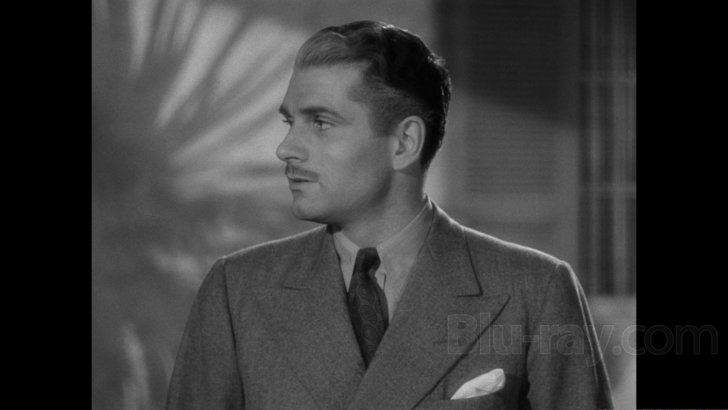
Presented in an aspect ratio of 1.33:1, encoded with MPEG-4 AVC and granted a 1080p transfer, Alfred Hitchcock's Rebecca arrives on Blu-ray courtesy of Criterion.
The following text appears inside the booklet provided with this Blu-ray release:
"This new digital transfer was created in 16-bit 4K resolution on a Lasergraphics Director film scanner at Motion Picture Imaging in Burbank, California, from the 35mm nitrate original camera negative. Digital restoration was undertaken by the Motion Picture ImagingGroup. The soundtrack was remastered from the original soundtrack negative at Chace by Deluxe in Burbank and restored by Disney Digital Studio Services. Additional restoration was performed by the Criterion Collection using Pro Tools HD and iZotope RX.
Project supervision: Walt Disney Studios Operations, Burbank, CA.
Colorist: Ray Grabowski/Motion Picture Imaging Group, Burbank, CA."
The new 4K master is the best that I have seen created for a Hitchcock film to date. I think that North by Northwest is in the same category, but it is a color film with different native characteristics and for some other reasons the end result there isn't as well optimized. Indeed, there are massive improvements in terms of density and fluidity that only very high-quality 4K masters can deliver when done properly, and this one most certainly is. You don't even have to project on a large screen to see how drastically different density is, and as a result overall image balance as well (compare screencapture #3 and screencapture #5 from the previous review of Rebecca to see the massive gap in quality). The grain of course is now very beautifully resolved and has the type of proper 'tightness' that 4K masters provide. Then there is the grading, which promotes an entirely new range of organic nuances that give the visuals a very rich filmic appearance (an excellent example can be seen in screencapture #4). Highlights, shadows, reflections, and again nuances now have completely different proper balance and dimensions. On the old release highlights, for instance, will randomly spike up or introduce unnatural contrasts that are not present on the new master. Image stability is excellent. There are a few slightly uneven transitions, but they are inherited from the OCN. Distracting debris, cuts, damage marks, stains, and all other standard age-related imperfections have been removed as best as possible. (Note: This is a Region-A "locked" Blu-ray release. Therefore, you must have a native Region-A or Region-Free player in order to access its content).
Rebecca Blu-ray Movie, Audio Quality 

There is only one standard audio track on this Blu-ray release: English LPCM 1.0. Optional English SDH subtitles are provided for the main feature.
The new lossless track and the old lossless from the previous release are a lot easier to compare because there does not appear to be a dramatic gap in quality in terms of fluidity and depth. Balance is practically identical as well. Additional work was done to clean up imperfections and this is likely where some viewers will spot discrepancies between the two tracks. There are no audio dropouts or distortions to report.
Rebecca Blu-ray Movie, Special Features and Extras 
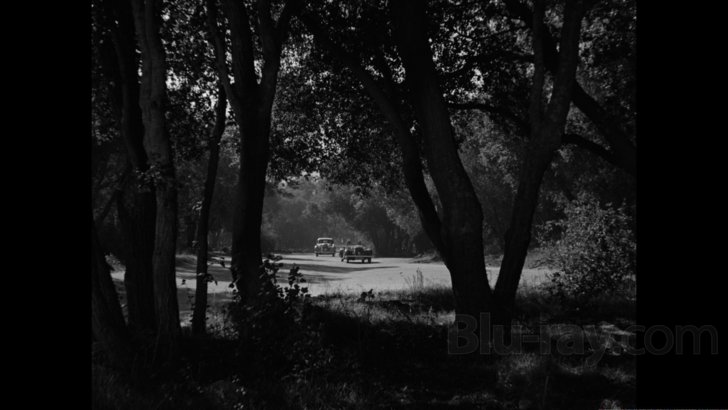
DISC ONE
- Theatrical Rerelease Trailer - original rerelease trailer for Rebecca. In English, not subtitled. (3 min, 1080i).
- Molly Haskell and Patricia White - presented here is a new filmed conversation between film critic and author Molly Haskell and film scholar Patricia White. The two ladies discuss the different stylistic layers that define Revecca and some of the obvious feminist overtones in the narrative. The conversation was filmed exclusively for Criterion in 2017. In English, not subtitled. (25 min, 1080p).
- Music and Effects Track - presented as LPCM 1.0.
- The Making of Rebecca - this documentary feature takes a closer look at the production history of Rebecca and Alfred Hitchcock's relationship with producer David O. Selznick. Included in it are clips from interviews with Peter Bogdanovich, Alfred Hitchcock's granddaughter Mary Stone, author/film historian Rudy Behlmer, and critic Richard Schickel, amongst others. The documentary was produced by John Cork and Lisa Van Eyssen in 2008. In English, not subtitled. (28 min, 1080i).
- Commentary - this archival audio commentary features film scholar Leonard J. Leff, author of Hitchcock and Selznick. It was recorded in 1990 and initially appeared on Criterion's LD release of Rebecca.
1. Ruthless adaptations
2. Train plans
3. Clumsy heroine
4. Rear projection
5. Isolation
6. Accented rivalry
7. Invisible style
8. Reptile and prey
9. Mothers
10. "Big heads"
11. Production Code
12. Varying truths
13. Doubles
14. The real Hitchcock
15. "The icebox factor"
16. Selznick edits
- Visual Effects - in this new video program, visual effects specialist and film historian Craig Barron (Titanic, Con Air) discusses the visual design of Rebecca and some specific lensing choices that enhanced Alfred Hitchcock's desired atmosphere for the film. (There are some very interesting comments about the recreation of the South of France and the footage that was shot in California). In English, not subtitled. (18 min, 1080p).
- Daphne Du Maurier: In the Footsteps of "Rebecca" - this documentary film focuses on the life and work of English author Daphne Du Maurier, whose novel inspired Alfred Hitchcock to shoot Rebecca. The documentary was produced by Elisabeth Aubert Schlumberger for French television in 2016. In French, with imposed English subtitles. (55 min, 1080i).
- The Search for "I" - presented in four galleries are archival screen tests with some of the initial choices for Joan Fontaine's character, lighting and makeup tests, notes and comments from producer David O. Selznick, and more.
1. Casting Gallery - in text format.
2. Screen Tests- Anne Baxter (12 min, 1080i)
- Joan Fontaine (8 min, 1080i)
- Vivien Leigh with Alan Marshal (4 min, 1080i)
- Vivien Leigh and Laurence Olivier (5 min, 1080i)
- Margaret Sullivan (8 min, 1080i)
- Loretta Young (5 min, 1080i)
4. Costume Tests - featuring Joan Fontaine. (3 min)
- Joan Fontaine and Judith Anderson - a collection of archival excepts from NBC's Tomorrow show with Tom Snyder (1980) and recordings of telephone interviews Leonard J. Leff conducted with Joan Fontaine and Judith Anderson (1986) while researching his book Hitchcock and Selznick.
1. Fontaine on NBC's Tomorrow (18 min, 1080i)
2. Fontaine Audio (21 min)
3. Anderson Audio (11 min)
- Alfred Hitchcock - this archival interview with Alfred Hitchcock was conducted by Tom Snyder for an episode of NBC's Tomorrow in November 1973. The iconic dierctor talks about some of the things that terrified him in life, his Jesuit training, his working methods (and image as a 'placid man'), violence in film and media, etc. In English, not subtitled. (44 min, 1080i).
- Rebecca on the Radio - presented here are three radio versions of Rebecca.
1. The Campbell Playhouse, 1938 (60 min)
2. Lux Radio Theatre, 1941 (60 min)
3. Lux Radio Theatre, 1950 (60 min)
- Booklet - 38-page illustrated booklet featuring critic and David O. Selznick biographer David Thomson's essay "Welcome to the Haunted House", reprinted production correspondence from the producer's archives, and technical credits.
Rebecca Blu-ray Movie, Overall Score and Recommendation 
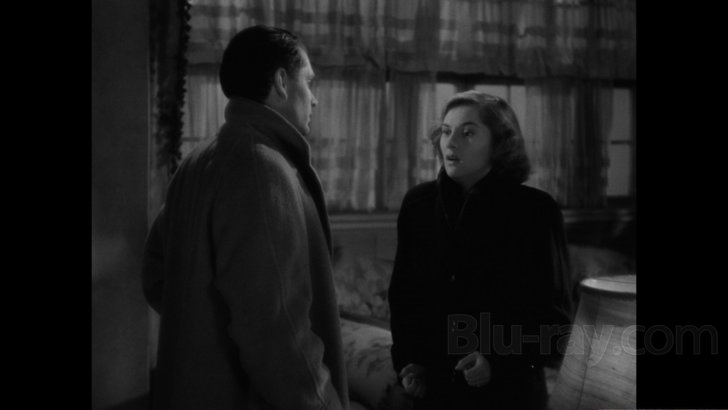
My take on Rebecca has always been that it was essentially a carefully crafted statement meant to make the right commercial impression on this side of the Atlantic. Alfred Hitchcock had already been quite successful in Europe, but Rebecca was his first Hollywood film and it was important that it did certain things right. (It is not a coincidence that the director and David O. Selznick had all sorts of different disagreements, and after production was completed the producer actually did different edits and then worked on the final cut). So while certainly nicely polished, I think that Rebecca does not quite have the unique ambience that Hitchcock's best work is known for. Criterion's Blu-ray release of Rebecca is sourced from an outstanding new 4K master, which is the best that I have seen created for a Hitchcock film to date. The release also offers an outstanding selection of new and archival special features. VERY HIGHLY RECOMMENDED.
Similar titles
Similar titles you might also like

Spellbound
1945

Notorious
1946

Secret Beyond the Door
4K Restoration
1947

My Cousin Rachel
2017

Reflections in a Golden Eye
Warner Archive Collection
1967

The Ghost Writer
2010

Stoker
2013

In a Lonely Place
1950

Marnie 4K
1964

The Secret in Their Eyes
El Secreto de Sus Ojos
2009

The Game
1997

Suddenly, Last Summer
Limited Edition to 3000
1959

The Manchurian Candidate
1962

North by Northwest 4K
1959

Great Expectations
1946

The Guilt of Janet Ames
1947

The Conversation
1974

Frank & Lola
2016

45 Years
2015

The Forbidden Room
2015
